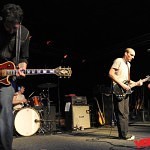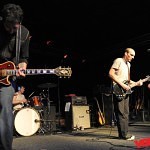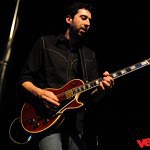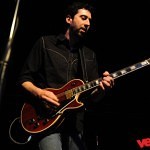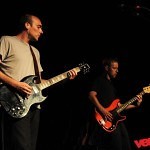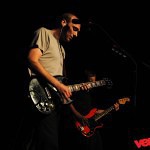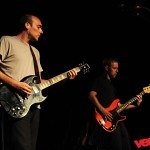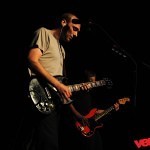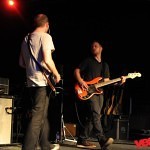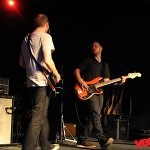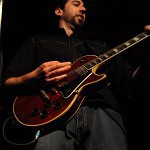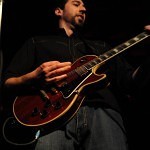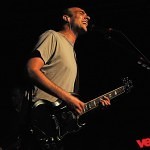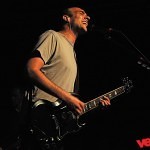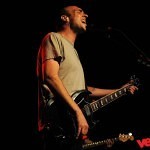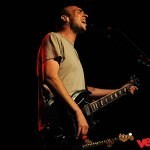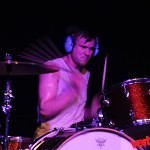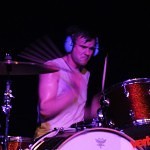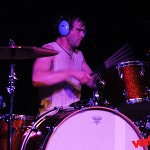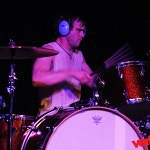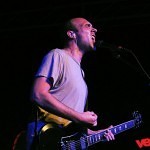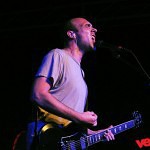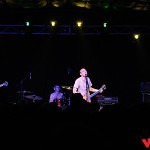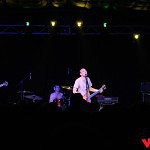 In late 2007 during some off-time from the Foo Fighters, bassist Nate Mendel started making phone calls. He was the instigator behind the reformation of Sunny Day Real Estate, back together with all four original members for the first time since 1995.
In late 2007 during some off-time from the Foo Fighters, bassist Nate Mendel started making phone calls. He was the instigator behind the reformation of Sunny Day Real Estate, back together with all four original members for the first time since 1995.
The band dates back to humble beginnings, when in 1992 in Seattle, Washington, a couple roommates — Mendel and guitarist Dan Hoerner — began making noise together. Signing to Sub Pop Records on the merit of a self-released seven-inch began the adventure of a band that has now given us four full-length records and a live album, despite two separate band breakups.
The music Sunny Day Real Estate created had such emotion and raw energy, and brought so many people together in perfect chest-pounding synchronicity. Early years rendered little information about the elusive band, with scarce photos and little-to-no interviews…so our intrigue grew. This time around, the band has granted Verbicide a window into their present world and possible future.
Late one Wednesday afternoon in Austin, Texas, I had an opportunity to visit with Mendel, Hoerner, vocalist Jeremy Enigk, and drummer William Goldsmith. Before taking the stage that evening at La Zona Rosa, Hoerner and Mendel sat down with me while the tape recorder rolled.
I hear a new song is being performed on this tour.
Dan Hoerner: Yes
And what is the title of this new song that so many fans are calling “Ten?”
Dan: It is as yet untitled.
Now that you’ve been touring about a month and playing together, are there any intentions for a new Sunny Day record?
Nate Mendel: Well, going into the tour we were kinda dancing around the idea a little bit, not really talking about it. Everyone had their own ideas of what they wanted from the tour [and] hoped for the tour, what was possible [and] wasn’t possible. We got out here and the shows seem to go pretty great. We’re having fun, sounding good, and everything. So that opened up the possibility of doing something else down the road — it’s conceivable. We’ve talked about it. It’s something everybody wants to do, it’s just a matter of how we actually do it.
Nate, if that does happen — since you’re back in the picture, playing and writing [with the] band — will the sound change?
Nate: I think it has to! There are many challenges to writing a new record, for any band at any time, but for us in particular. It’s like, okay, we are this one band that does this one thing, but it would not be a good idea to go back and try to sound like ourselves from 15 years ago. So we have to try to invent something new.
Dan: I think Sunny Day has shown that we generally try and change, and are really averse to repeating ourselves endlessly. I’m sure that we’ll continue to explore. I like this guitars/bass/drums thing, though; we have a really good live sound, and I think that’s a great core, instead of trying to make it into some weird, crazy, “studio thing.” I think we’ll use the components that exist in our live sound, which is really satisfying. I think that’s a good place to write from.
When people have asked in the past about the breakup, I hear you guys mention “early mistakes.” Did Sunny Day grow too fast? Or were you capable of continuing what Sunny Day had become?
Nate: That’s a tricky question. Probably each of us would answer it differently, because we haven’t done anything in so long. We’re writing our history as we’re going right now. People’s memories are faded, and [we’re discussing] things that we didn’t sit down and talk about. We broke up, and then split apart. Now we have to go back and ask, “What really happened back then? What was that all about?”
Dan: In a lot of cases, it’s just water under the bridge, and we just accept that everybody has evolved over time. It’s inevitable.
Nate: Definitely; I think we made mistakes in how we were doing things, but I wouldn’t really change anything — it’s who we are; it made sense at the time, and it came from a very genuine place. It was the character of the band to make those mistakes — they’re part of who we are. Hopefully we can move forward and correct some of those. We’ll see. (laughter)
Dan: I think an epic mistake of unheard of proportions is coming our way! (laughter)
 Do you still feel a sense of the anti-establishment that you portrayed in the early days? Are you trying to maintain any of that now?
Do you still feel a sense of the anti-establishment that you portrayed in the early days? Are you trying to maintain any of that now?
Dan: I think that there is a theme to Sunny Day’s music that comes from a place inside us, and I think that that will probably be similar. There is a certain element to the way we go about being a band, doing our thing; that is its own thing and might be anti-establishment. I don’t think we would consciously do some of the things we did back then. I think we’ve evolved away from that — I don’t see us avoiding press and trying to control our exposure. We have now learned to accept things with better grace–
Nate: –Without being desperately non-conventional.
Dan: We’re weird enough. What Sunny Day creates is plenty of uniqueness. We don’t have to fend off all attempts at conforming. Back in the day, we wouldn’t have done this interview. We never believed that that was something we’d have to do. We just wanted to play music, only…and let our music speak for itself exclusively, instead of trying to be smart and say things, which inevitably failed. The idea was actually pretty cool and I would still love to be able to live like that.
Dan, you’ve mentioned that there are a lot of cover bands you would have willingly been in, playing someone else’s music [such as the Replacements or U2]. How did you come to distinguish yourself as a writer and player on your own?
Dan: When I realized I wasn’t good enough, I had to learn to bang on the noise maker in my own way, and try and figure out a way to do it, that I could do. (laughter) I couldn’t even play “Sunday Bloody Sunday” — that’s like the easiest riff in the world, but I couldn’t figure it out. Literally, I’m terrible at trying to figure out other people’s music, and even my own past songs!
The last 10 years have [produced] many individual collaborations with other artists. Any favorites?
Nate: Oh man, mostly I’ve just done the Foo Fighters, then The Fire Theft. Played a few songs on a Juno record, a long time ago — some friends of mine from Seattle, that was really fun. Foo Fighters are always having people come up and play with us and record with us, and there have been some pretty great moments. Getting to play with Brian May, that’s probably my favorite.
Dan: Sunny Day’s really my thing. Jammin’ with my kids, though, that’s been cool. Final answer!
You guys are playing “Grendel” on this tour. Is this tour the first time [you’ve performed that song] live? And why now?
Nate: That’s a question for Dan because I don’t know why. You guys had the opportunity…
Dan: We never felt worthy of playing “Grendel” live, I think. We wrote “Grendel” in the studio and it turned out to be — in my opinion — to be one of the most epic moments of Sunny Day Real Estate, and we never felt we could replicate it live. There was no way we would try to play it without Nate, and we broke up before we had an opportunity to try to figure out how to play it live. It wasn’t until the reunion that we had all the right players and [we decided] that we should just play each of the tracks. When we played “Grendel” it came together and made complete sense. Now that we have Mendel we can pull it off.
Was that a song that just happened entirely in the studio?
Dan: I had the riff that you hear that drones throughout most of the song. And I think that [as for] the rest of it, we all kinda compositely started throwing stuff on and built it in the studio, which is not our writing style. Typically we’ll write a song as a full band, but with that one we did layering and worked on it a bit. Jeremy ultimately finished it in Seattle with the vocals, and I put down that feedback layer that you hear throughout the song. Those elements coming together — the vocals and the feedback — created the perfect atmosphere of desperation and destruction.
Have you played your track on “Guitar Hero?”
Nate: I’ve seen it played on the internet, which is hilarious.
Dan: I’m worthless on “Guitar Hero,” but I can’t wait to have some geek show me how to do it!
How has your experience playing a plastic game guitar gone?
Dan: Nate’s actually good at it. Nate shreds on it!
Nate: It’s kind of embarrassing, but I was making a record a couple years ago, and between takes I would go up and play “Guitar Hero.” I got really good at it. Sitting around in the studio, they were kinda worried, saying, “Dude, you’ve gotten too good at this. Stop!”
Dan: I’ve gotten really good at killing zombies on this tour. I’ve been playing “Resident Evil 5.”
Why was there a need to make The Fire Theft a new band, with a changed name?
Nate: When it came time to do the Fire Theft project…[we decided] it’s not really Sunny Day, so we won’t call it Sunny Day. I got a lot of heat from friends saying, “Why don’t you just call it Sunny Day?” I always felt like, with these bands from the ‘70s where the cousin of the bass player is the only real original member, just start a new band! I’d rather feel good about the current project, to create something brand new, than to use your past as a crutch. If we’d gone out and played as Sunny Day Real Estate we would have played shows with people in the room, but we went out as the Fire Theft and dealt with the repercussions of trying to start something new — and I’m happy that we did it that way.
Click here to download “Seven” from Sunny Day Real Estate
